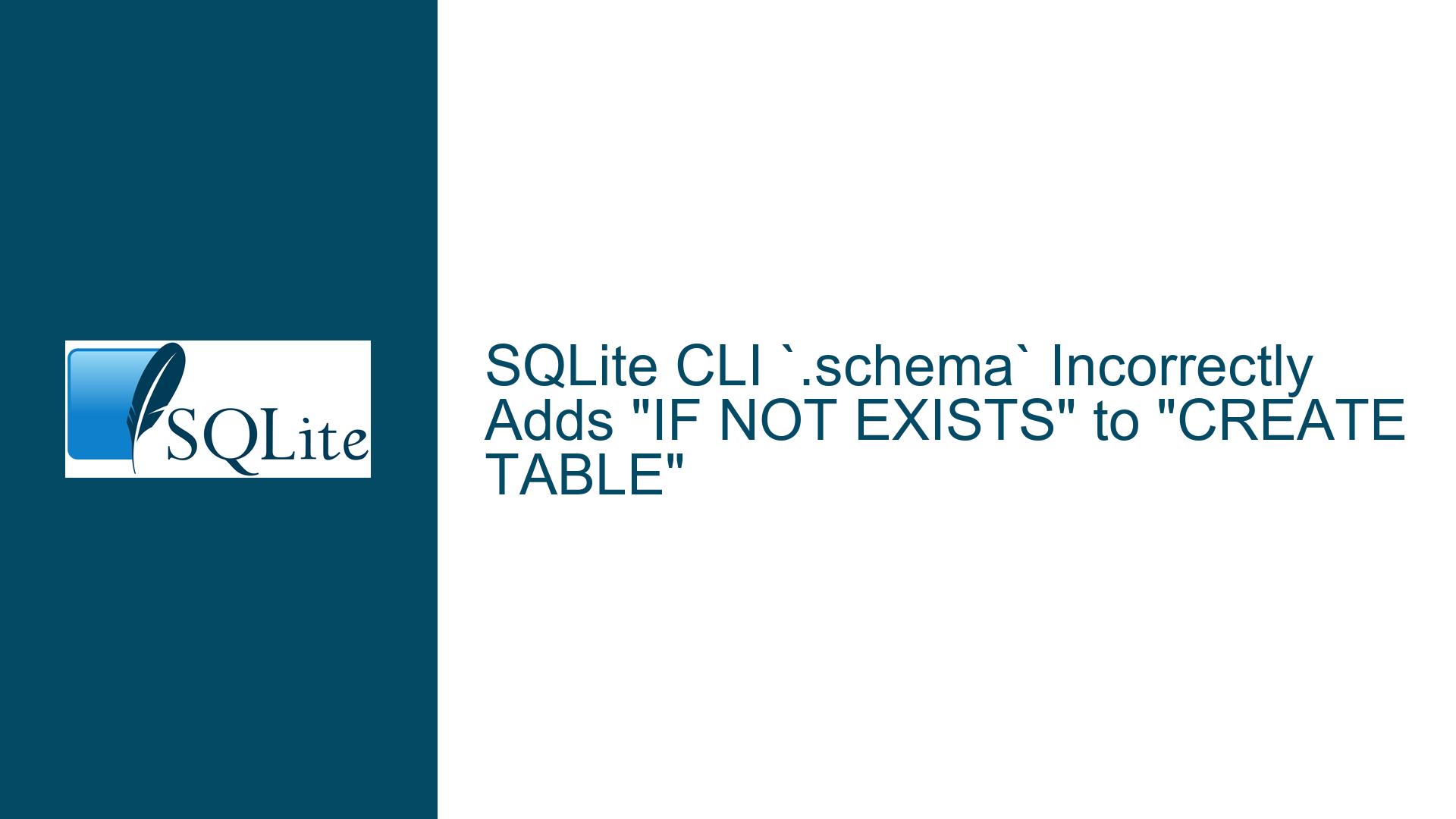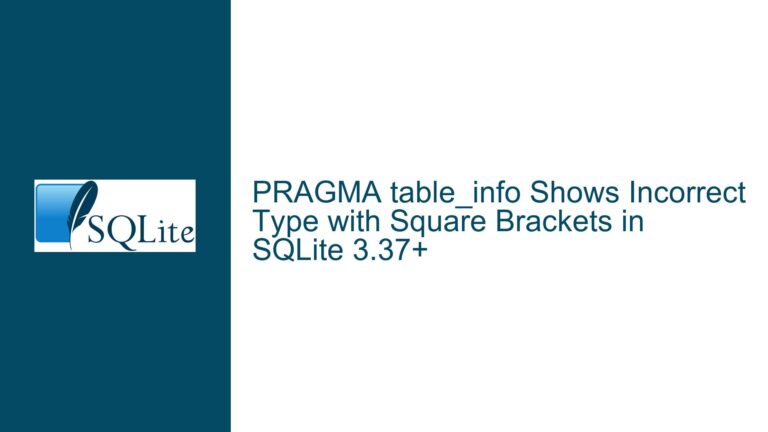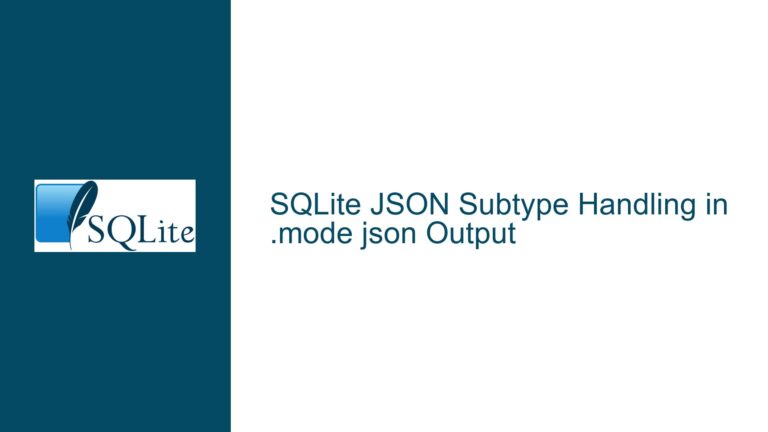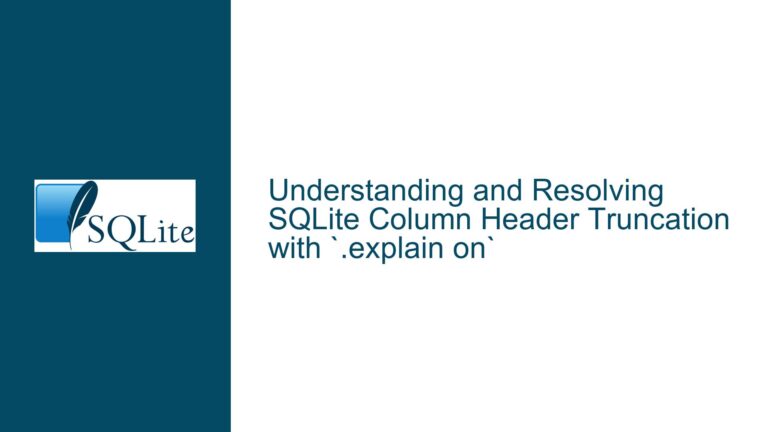SQLite CLI `.schema` Incorrectly Adds “IF NOT EXISTS” to “CREATE TABLE”
Issue Overview: .schema Command Modifies CREATE TABLE Statements with "IF NOT EXISTS"
The .schema command in the SQLite command-line interface (CLI) is designed to output the SQL statements required to recreate the schema of a database or a specific table. However, users have observed that the .schema command unexpectedly modifies CREATE TABLE statements by adding the IF NOT EXISTS clause, even when the original table creation statement did not include it. This behavior occurs specifically when table names are quoted using double quotes ("), regardless of whether the table is a plain table or a shadow table associated with Full-Text Search (FTS) features like FTS3, FTS4, or FTS5.
The issue stems from a discrepancy between the intended behavior described in the SQLite source code comments and the actual implementation. According to the source code, the modification to include IF NOT EXISTS was intended only for shadow tables in FTS3/4/5. However, the implementation applies this modification to any table with a quoted name, leading to unexpected behavior for users who quote table names as a general practice.
This behavior can cause confusion, especially for users migrating SQL code from other database systems like MariaDB, where quoting identifiers is a common practice. The unexpected addition of IF NOT EXISTS can also lead to subtle issues in automated workflows or scripts that rely on the exact output of the .schema command.
Possible Causes: Quoted Identifiers and Shadow Table Logic Misalignment
The root cause of this issue lies in the interaction between two key aspects of SQLite’s implementation: the handling of quoted identifiers and the logic for shadow tables in FTS3/4/5.
1. Quoted Identifiers and the "Yukky Names" Logic
In SQLite, identifiers such as table names and column names can be quoted using double quotes (") or square brackets ([]). Quoting is often used to avoid conflicts with reserved keywords or to allow special characters in names. However, the SQLite CLI treats quoted identifiers differently in the .schema command. Specifically, the CLI modifies CREATE TABLE statements for tables with quoted names by adding the IF NOT EXISTS clause. This behavior is based on the assumption that quoted names are more likely to be associated with "yukky" or non-standard names, such as those used in shadow tables.
The source code comment suggests that this modification was intended only for shadow tables in FTS3/4/5. However, the implementation applies the modification to any table with a quoted name, regardless of whether it is a shadow table or a plain table. This misalignment between the intended behavior and the actual implementation is the primary cause of the issue.
2. Shadow Tables and FTS3/4/5
Shadow tables are internal tables used by SQLite’s Full-Text Search (FTS) features (FTS3, FTS4, and FTS5) to store auxiliary data. These tables have names that are derived from the main FTS table name and are often quoted to avoid conflicts with user-defined tables. The original intention behind the IF NOT EXISTS modification was to ensure that .schema commands for FTS shadow tables would not fail if the tables already existed. However, the logic for identifying shadow tables is not robust enough to distinguish them from plain tables with quoted names.
3. Impact of Quoting Practices
The issue is exacerbated by differing quoting practices among users. Some users quote all identifiers as a general practice, while others quote only when necessary (e.g., for reserved keywords). Users who quote all identifiers, such as those migrating from databases like MariaDB, are more likely to encounter this issue. The unexpected addition of IF NOT EXISTS can lead to confusion and potential issues in automated workflows that rely on the exact output of the .schema command.
Troubleshooting Steps, Solutions & Fixes: Addressing the .schema Behavior
To address the issue of the .schema command incorrectly adding IF NOT EXISTS to CREATE TABLE statements, users can take several steps to troubleshoot and mitigate the problem. These steps include understanding the behavior, adjusting quoting practices, and exploring workarounds or custom solutions.
1. Understanding the Behavior
The first step in troubleshooting this issue is to understand the behavior of the .schema command and its interaction with quoted identifiers. Users should be aware that the CLI modifies CREATE TABLE statements for tables with quoted names by adding the IF NOT EXISTS clause. This behavior is not documented in the official SQLite documentation and can lead to unexpected results.
To observe the behavior, users can create a table with a quoted name and then use the .schema command to inspect the output:
CREATE TABLE "example_table" ("column1" TEXT);
.schema "example_table"
The output will include the IF NOT EXISTS clause, even though it was not part of the original CREATE TABLE statement:
CREATE TABLE IF NOT EXISTS "example_table" ("column1" TEXT);
2. Adjusting Quoting Practices
One way to avoid this issue is to adjust quoting practices. Users who quote all identifiers as a general practice may consider quoting only when necessary, such as for reserved keywords or special characters. For example, instead of quoting all table names, users can quote only those that conflict with reserved keywords:
CREATE TABLE example_table ("order" TEXT, "rank" INTEGER);
This approach reduces the likelihood of encountering the issue while still maintaining compatibility with reserved keywords.
3. Using Custom Scripts for Schema Extraction
For users who require precise control over the output of schema extraction, a custom script can be used to generate CREATE TABLE statements without the IF NOT EXISTS clause. This can be achieved by querying the sqlite_schema table directly and constructing the statements manually. For example:
SELECT sql FROM sqlite_schema WHERE name = 'example_table';
This query will return the original CREATE TABLE statement without any modifications. Users can then use this output in their workflows or scripts.
4. Modifying the SQLite CLI Source Code
For advanced users, another option is to modify the SQLite CLI source code to align the behavior with the intended logic. The relevant code can be found in the SQLite source repository, specifically in the commit referenced in the discussion (c7021960). Users can modify the logic to ensure that the IF NOT EXISTS clause is added only for shadow tables in FTS3/4/5, not for all tables with quoted names.
5. Reporting the Issue to the SQLite Development Team
Users who believe this behavior is a bug or unintended can report the issue to the SQLite development team. Providing a detailed explanation of the issue, along with examples and use cases, can help the team prioritize a fix or clarify the intended behavior in the documentation.
6. Using Alternative Tools for Schema Management
Finally, users can explore alternative tools for schema management that do not exhibit this behavior. For example, some SQLite GUI tools or libraries provide schema extraction features that do not modify CREATE TABLE statements. These tools can be used as a workaround until the issue is resolved in the SQLite CLI.
By understanding the behavior, adjusting quoting practices, and exploring workarounds or custom solutions, users can effectively address the issue of the .schema command incorrectly adding IF NOT EXISTS to CREATE TABLE statements. This approach ensures that users can continue to work with SQLite effectively while avoiding unexpected behavior in their workflows.






